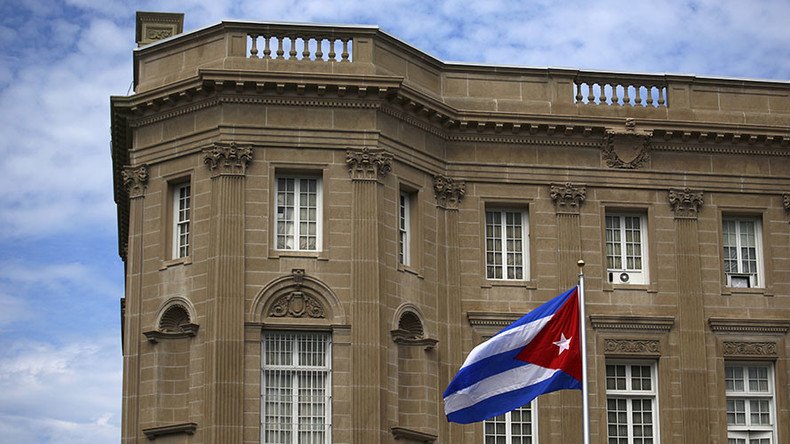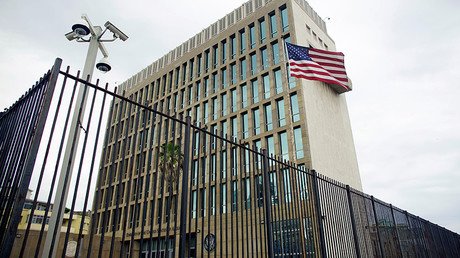US expels 15 Cuban diplomats to 'ensure equity' after Havana withdrawal

Washington has given 15 Cuban diplomats seven days to leave the US, citing the draw-down of US diplomatic presence in Havana and accusing Cuba of failing to protect US diplomats reportedly affected by mysterious "health attacks."
On Tuesday, Secretary of State Rex Tillerson said the expulsion of Cuban diplomats is intended to "ensure equity" between Washington and Havana, AP reported.
The move is "due to Cuba's failure to take appropriate steps to protect our diplomats," Tillerson said.
Last week, the State Department announced it would withdraw half the staff at the US embassy in Cuba, citing mysterious "health attacks" that have affected at least 22 Americans.
The decision to withdraw US personnel from Cuba was necessary to "minimize the number of diplomats at risk of exposure to harm," Tillerson said on Tuesday.
The secretary of state said the US is maintaining diplomatic relations with Cuba and will cooperate with the country while the investigation into the unexplained "health attacks" continues.
The US has not provided sufficient information for the investigation into the alleged attacks, Cuban Foreign Minister Bruno Rodriguez said Tuesday.
Twenty-two US diplomats and their families have experienced unexplained health problems over the past year, some as traumatic as brain injury and hearing loss. Investigators have been unable to determine who or what is the cause.
Officials told the New York Times the FBI had visited the homes of diplomats in Cuba but had not been able to detect anything. Security footage of the homes showed nothing suspicious. Officials suspected some kind of futuristic “sonic attack.” Some of the diplomats reported hearing loud noises or feeling vibrations when the incidents occurred but others heard and experienced nothing. The FBI has been unable to duplicate the symptoms in a lab.
Cuba has denied any involvement in the attacks alleged by the State Department.
"The Cuban government has never perpetrated nor will it ever perpetrate attacks of any kind against diplomats," said the Cuban Foreign Ministry in a statement last week.
"The Cuban government has never permitted nor will it ever permit the use of its territory by third parties for this purpose. There is no evidence so far of the cause or the origin of the health disorders reported by the US diplomats."
The US will stop issuing visas in Cuba indefinitely and is halting official travel due to the attacks. Cubans seeking visas to enter the US may be able to apply through embassies in nearby countries, unnamed officials told media.
“I commend the US State Department for expelling a number of Cuban operatives from the US," said Senator Marco Rubio (R-Florida), who had previously called for closing the US embassy in Havana.
READ MORE: More mystery surrounds 'health attacks' on US diplomats in Cuba
Meanwhile, some US diplomats in Cuba said they were disappointed to be ordered to leave.
"I am an optimist and hope we will return one day, before too long," the embassy's top official, career diplomat Scott Hamilton, wrote on Facebook.
"This decision appears to be purely political, driven by the desire of a handful of individuals in Congress to halt progress between our two countries," weighed in James Williams, president of lobbying group Engage Cuba, according to Reuters.
The US and Cuba reestablished diplomatic relations in 2015, at the initiative of President Barack Obama. Washington and Havana had been estranged since 1961, when President John F. Kennedy cut ties with Cuba and imposed an embargo on the island.
Last year, President Obama traveled to Cuba, looking to warm the long-frozen relations with the Communist-run country.
In June, however, President Donald Trump said he was reversing “the last administration’s completely one-sided deal with Cuba.” He re-imposed some restrictions on travel to Cuba, but left the newly-established embassies in Washington and Havana open.













